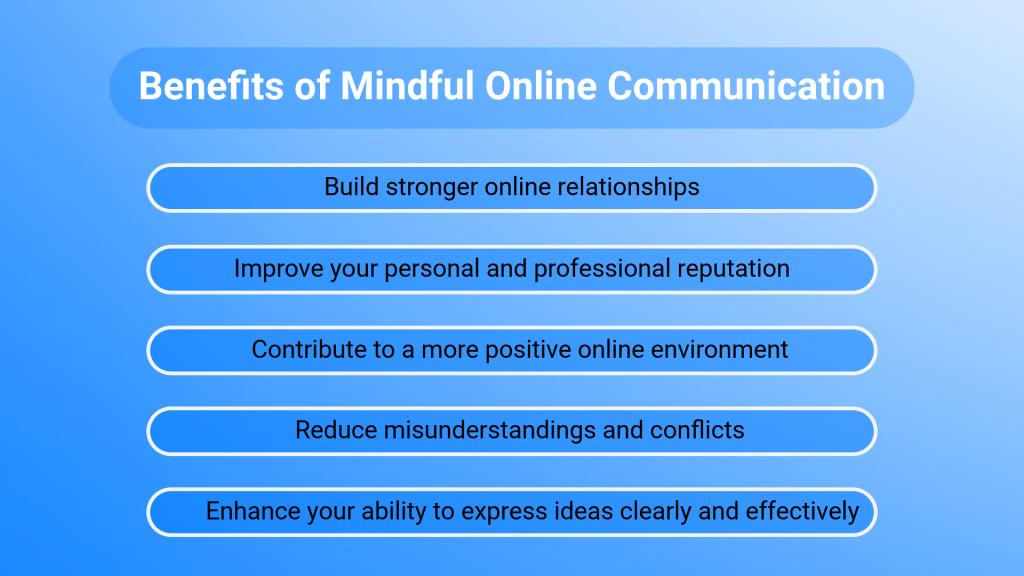In today’s interconnected world, online communication has become integral to our daily lives. Whether we’re interacting on social media, participating in online forums, or sending emails, the way we express ourselves digitally can significantly impact our relationships, reputation, and overall online experience. This article explores seven essential strategies for maintaining respectful and effective communication in the digital realm.
The Importance of Mindful Online Communication

The internet provides unprecedented opportunities to connect with people from all walks of life. However, this vast digital landscape also presents unique challenges when communicating effectively and respectfully. Without face-to-face interaction, it’s easy for messages to be misinterpreted or for emotions to run high. By adopting mindful communication practices, we can create a more positive and productive online environment for everyone.
1. Think Before You Type
One of the most crucial aspects of respectful online communication is thinking before you type. It’s tempting to fire off a quick response in the heat of the moment, especially when we feel passionate about a topic. However, this approach often leads to misunderstandings and conflicts.
To avoid this, try the following:
- Take a deep breath and pause before responding to any message that elicits a strong emotional reaction
- Read your message out loud to yourself before sending it
- Consider how someone with a different perspective might interpret your words
You’re more likely to craft a thoughtful and respectful response by giving yourself a moment to reflect.
2. Use Clear and Concise Language
In the digital world, clarity is key. Without the benefit of tone of voice or body language, your words must carry the full weight of your intended message. To ensure your communication is clear and concise:
- Use simple, straightforward language
- Avoid jargon or overly technical terms unless you’re sure your audience will understand them
- Break long messages into shorter paragraphs for easier readability
- Use bullet points or numbered lists to organize information
Remember, the goal is to communicate effectively, not to impress others with your vocabulary or writing style.
3. Practice Empathy and Compassion
Empathy is the ability to understand and share the feelings of another person. In online communication, practicing empathy can help bridge gaps in understanding and foster more meaningful connections. To cultivate empathy in your digital interactions:
- Try to see things from the other person’s perspective
- Acknowledge the emotions behind someone’s words, even if you disagree with their point of view
- Respond with kindness and understanding, even in difficult conversations
You can help create a more positive and supportive digital environment by approaching online communication with compassion.
4. Be Mindful of Tone and Context
Without the benefit of facial expressions and vocal cues, a message’s tone can easily be misinterpreted. To avoid unintended offense or confusion:
- Use emojis or emoticons sparingly to convey tone (when appropriate for the platform and audience)
- Be aware of cultural differences that might affect how your message is received
- Consider the context of the conversation and adjust your language accordingly
Remember that sarcasm and humor can be particularly challenging to convey in written form, so use them cautiously in online communication.
5. Respect Privacy and Boundaries
In the digital age, it’s important to be mindful of privacy concerns and personal boundaries. To maintain respectful online communication:
- Ask for permission before sharing someone else’s personal information or content
- Respect others’ wishes if they ask you not to contact them or to limit communication
- Be cautious about discussing sensitive topics in public forums or on social media
Respecting others’ privacy and boundaries, you help create a safer and more comfortable online environment.
6. Fact-Check and Verify Information
The spread of misinformation online is a significant challenge in today’s digital landscape. To contribute to a more informed and truthful online discourse:
- Verify information before sharing it with others
- Provide sources for claims or statistics when possible
- Be willing to admit when you’re wrong or have shared inaccurate information
By prioritizing accuracy and truth in your online communication, you help combat the spread of misinformation and build trust with your audience.
7. Utilize Appropriate Language Filters
In some online spaces, additional measures may be necessary to ensure respectful communication. One such tool is a profanity filter, which can help maintain a family-friendly environment by automatically screening out inappropriate language. While not a substitute for thoughtful communication, these tools can be useful in certain contexts, such as educational platforms or community forums.
Implementing These Strategies in Various Online Platforms
Different online platforms may require slightly different approaches to communication. Here’s a quick guide to applying these strategies across various digital spaces:
| Platform | Key Considerations |
| Social Media | Be mindful of your audience, use appropriate hashtags, and consider the public nature of your posts |
| Use clear subject lines, maintain a professional tone, and proofread carefully | |
| Online Forums | Follow community guidelines, stay on topic, and be respectful of others’ opinions |
| Video Calls | Pay attention to body language, use visual aids when necessary, and be aware of background distractions |
| Instant Messaging | Be concise, use appropriate emojis to convey tone, and respect others’ time |
Navigating Difficult Online Conversations
Even with the best intentions, you may find yourself in challenging online conversations. When faced with conflict or disagreement:
- Take a step back and assess the situation objectively
- Avoid personal attacks or inflammatory language
- Focus on the issue at hand rather than the person
- Look for common ground or areas of agreement
- Be willing to agree to disagree if necessary
- Know when to disengage from an unproductive conversation
Remember, taking a break from online communication is okay if you’re feeling overwhelmed or frustrated.
The Benefits of Mindful Online Communication

By implementing these strategies for respectful digital discourse, you can:
- Build stronger online relationships
- Improve your personal and professional reputation
- Contribute to a more positive online environment
- Reduce misunderstandings and conflicts
- Enhance your ability to express ideas clearly and effectively
Ultimately, mindful online communication benefits you and the broader digital community.
Continuing to Improve Your Digital Communication Skills

Becoming a skilled and respectful online communicator is an ongoing process. To continue improving:
- Regularly reflect on your online interactions and look for areas of improvement
- Seek feedback from trusted friends or colleagues about your digital communication style
- Stay informed about evolving online etiquette and best practices
- Practice active listening in your online conversations
- Be open to learning from others and their diverse perspectives
By committing to ongoing growth and improvement, you can become a positive force in the digital world, fostering meaningful connections and contributing to a more respectful online environment for all.




